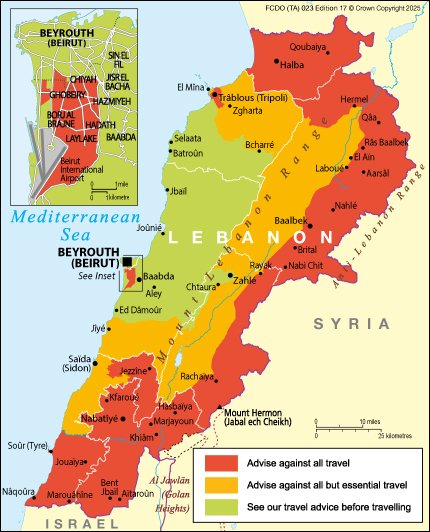Tips & Advices
Lebanon travel advice – GOV.UK

Your travel insurance could be invalidated if you travel against advice from the Foreign, Commonwealth & Development Office (FCDO). Consular support is also severely limited where FCDO advises against travel.
Areas where FCDO advises against travel
Areas in Beirut and Mount Lebanon Governorate
FCDO advises against all travel to the following areas of Beirut and its southern suburbs, excluding Route 51 from central Beirut to and past Rafic International Airport:
- Tariq el Jdideh and the area east of Tariq el Jdideh, south of Jalloul Street, west of Hourch and the war cemetery (not including the war cemetery), and south of the Soulieman Bastani
- Ghobeiry and the area north of Ghobeiry but south of Yarmouk street, the war cemetery and Horsh park (not including Horsh park and the cemetery and Yarmouk street)
- Chiyah (south and west of the Rizkallah Semaan road)
- Haret Hraik
- Burj Al Barajneh
- Mraije
- Laylaki
- all other areas west of the Camil Chamoun Boulevard (south of Forn el Chebbak) that becomes the Old Saida Road through Hadath to Beirut airport
- the Area of Bir Hassan bordered by the following roads: West of Highway 51; East of Beirut Saida Highway; South of Ghobeiry Road; North of Abbas El Mousawi; but excluding the neighbourhood block containing the Rafiq Hariri hospital, Ministry of Public Health and Qatari Embassy (which is bordered by Ali Said al Khansa road in the west, Ghoberi Road in the north and Ghoberi Road south and Highway 51 in the East)
FCDO advises against all but essential travel to:
The area of Mount Lebanon Governorate south of (but not including) the road from Khiam El Damour in the west (and extending to the Mediterranean Sea), through Mghayreh, Kfar Him, Deir El Qamar, Maaser Beit Ed Dine, Batloun, Barouk and Maaser El Chouf, to where the Barouk-Joub Jannine Road crosses the Mount Lebanon-Beqaa Governorate boundary in the east.
Areas in the South and Nabatiyeh Governorates
FCDO advises against all travel to:
- Areas south of the Litani River, to where it reaches the Nabatiyeh Governate border. This area includes the cities of Tyre, Rachidiyeh and Naqoura
- The Governorate of Nabatiyeh.
- The District of Jezzine
FCDO advises against all but essential travel to:
- All other areas of South Governorate north of the Litani river
Areas in the Beqaa Governorate
FCDO advises against all travel to:
- Areas of Beqaa Governorate that lie east of (but not including) the Rachaiya-Marjaayoun Road, from where it crosses the Nabaityeh/Beqaa boundary, heading north-eastward along the Masnaa-Rachaiya Road, Beirut-Damascus International Highway, Bar Elias, and Houch Hala to (and including) Riyaq on the Baalbek-Hermel Governorate boundary. The towns of Khiam, Hasbaya, Rachaya, Al Masnaa, Aanjar and Riyaq are in this area
FCDO advises against all but essential travel to:
-
The area of Beqaa Governorate north and east of (but not including) the Aintoura-Zahle Road, from Darh El Harf on the Mount Lebanon/Beqaa Governorate boundary to (but not including) Zahle, extending to the ‘Eastern Beqaa Governorate’ area
-
The rest of Beqaa Governorate, except for:
- The areas south and west of (and including) the Aintoura-Zahle Road, from Darh El Harf on the Mount Lebanon/Beqaa Governorate boundary to (and including) Zahle
- Zahle and the area that lies west of (and including) the Zahle-Baalbek Highway and Chtoura-Nabatiyeh Road, running southward from Zahle to the intersection with the Barouk-Joub Jannine Road
- The area north of (and including) the Barouk-Joub Jannine Road, from where it crosses the Mount Lebanon/Beqaa Governorate boundary to the intersection with the Chtoura-Nabatiyeh Road
Areas in the Baalbek-Hermel Governorate
FCDO advises against all travel to:
- The area of Baalbek-Hermel Governorate east of (and including) the Zahle-Baalbek and Baalbek-Qaa Highways, from where the Ali El Nahri Road joins the Zahle-Baalbek Highway near Riyaq, northward past Baalbek, and through Makneh and Laboueh to the intersection with the Hermel-Ras Baalbek Road
- The area of Baalbek-Hermel Governorate north and east of the roads between the intersection of the Baalbek-Qaa Highway and the Hermel-Ras Baalbek Road to the North Governorate boundary via (and including) Hermel and Zouaitini
FCDO advises against all but essential travel to:
- all other areas of Baalbek-Hermel Governorate
Areas in the North Governorate
FCDO advises against all travel to the city of Tripoli, along the city boundaries.
FCDO advises against all but essential travel to:
- The area of North Governorate north and east of the main roads from Bohssas to Ariz via Kousba, Ehden, and Kfarsghab, and north and east of the Ariz-Baalbeck Road until it meets the Baalbek-Hermel Governorate boundary,excluding the city of Tripoli. This includes the areas south up to the Tripoli-Kousba road but not including the road or the towns which run along it stretching from Bohssas in the east, southwards to Kousba and then eastwards on the Amioun-Ehden Road to Ehden and on to Ariz and the cedar areas
Areas in the Akkar Governorate
FCDO advises against all travel to Akkar Governorate.
Palestinian refugee camps
FCDO advises against all travel to the 12 Palestinian refugee camps. See Palestinian refugee camp locations on the UN Relief and Works Agency website.
For further information on why we advise against travel, see Conflict affecting Lebanon and Regional risks..
Conflict affecting Lebanon
Although a ceasefire in the conflict between Israel and Lebanese Hizballah came into force on 27 November, the security environment remains unpredictable. Israeli Defence Forces continue to conduct airstrikes and artillery fire at targets in Lebanon, including the South, near the Israeli and Syrian borders, and in the Nabatiyeh and Beqaa Governates north of the Litani River. The closure or disruption of roads and exit routes at short notice could affect your ability to leave the country. Do not rely on the FCDO being able to evacuate you in an emergency.
The security situation presents a range of serious risks to British Nationals in Lebanon, including the following.
Military activity across Lebanon
There are ongoing airstrikes, mortar and artillery exchanges across Lebanon, primarily on the boundary with Israel and the Beqqa Valley, but there have also been some in the South and in the Nabatiyeh Governates north of the Litani river. Strikes in other areas of the country cannot be ruled out, including in the southern suburbs of Beirut. The FCDO is aware that many people are returning to the south of Lebanon. Be aware that the Israeli Defence Force is continuing to tell people not to return to areas in the south close to the Blue Line. There are reported incidences of the Israeli Defences Forces firing on people who get too close to locations where they retain a presence.
Further air-strikes in Lebanon cannot be ruled out. Strikes have resulted in civilian casualties and the destruction of residential buildings. There are also strikes both in population centres and in rural areas. We advise you to keep up to date with the latest situation including using multiple media sources to understand frequency and location of strikes as these may change rapidly. There are various mapping sources available online.
Access to Beirut airport
Conflict between Israel and Iran is affecting airspace across the region, including in Lebanon. There is a risk of flight disruption and issues accessing the airport, whether by airspace closures, traffic congestion, temporary roadblocks or closure caused by Israeli airstrikes nearby. If you are travelling to the airport, check the local security situation and only make the journey if you judge it safe to do so. Remain alert to local conditions as these could change quickly.
Civil disorder
Celebratory gunfire is common in Lebanon and there is a risk from gunfire being fired in residential areas in reaction to major regional developments. If you hear gunfire, take cover immediately. Protests related to regional events could also take place at short notice and may escalate quickly. Exercise caution, avoid demonstrations, and monitor local media for developments.
Local support
The Embassy remains open as normal and continues with essential work, including full services to British nationals.
Keep up to date with local and international media including TV and radio stations such as Virgin Radio Lebanon (FM 89.5) and Voice of Lebanon / Sawt Lubnan (FM 100.3 – 100.5) which may be useful sources of information on any developments.
You should have a personal emergency plan that does not rely on the UK government. This may include the ability to leave quickly or to shelter in place if you judge it necessary and safe to do so.
Read FCDO advice on what to do if you’re affected by a crisis abroad and how to prepare.
Help and support in Lebanon
You can contact the emergency services by calling 112.
If you need urgent help (for example, you’ve been attacked, arrested or someone has died), call +961 (0)1 960 800.
Travel insurance
If you choose to travel, research your destinations and get appropriate travel insurance. Insurance should cover your itinerary, planned activities and expenses in an emergency.
About FCDO travel advice
FCDO provides advice about risks of travel to help you make informed decisions. Find out more about FCDO travel advice.
Get travel advice updates
Sign up to get email notifications when this travel advice is updated.
Follow FCDO:
Tips & Advices
Should Vegans Pay Lower Health Insurance Premiums?

Tips & Advices
Why Travel Insurance Can Be a Lifesaver for Your Trip, Find out now

Monday, July 21, 2025
Whether you’re embarking on a short weekend away or a lengthy journey across continents, travel insurance remains one of the most vital components of your travel preparations. Unexpected circumstances can quickly turn your perfect trip into an expensive ordeal, and the right insurance coverage can safeguard you against significant financial burdens.
What Exactly Does Travel Insurance Include?
A comprehensive travel insurance plan typically includes protection against:
- Trip cancellations and interruptions
- Flight or transport delays
- Lost, stolen, or delayed luggage
- Stolen cash, credit cards, passports, or other vital documents
- Medical emergencies, hospitalization, and repatriation expenses
Government guidelines across Ireland and the UK strongly recommend comprehensive travel insurance due to the potential high costs of medical care abroad. According to official government resources, the costs associated with emergency medical treatment or repatriation can be extraordinarily high, often amounting to thousands of euros.
Importance of Medical Coverage
Medical coverage is particularly crucial. Accidents or illnesses abroad are unpredictable and costly. Ireland’s official guidance underscores that hospital treatments or emergency flights back home can be extremely expensive without proper insurance. Even a simple travel insurance policy can ensure you’re not left with overwhelming bills and additional stress during an already difficult time.
Types of Travel Insurance Policies Available
Different travel needs require different insurance solutions. Here are the primary policy types to consider:
- Single-trip Policies: Ideal for occasional travelers planning one-off trips.
- Annual Multi-trip Policies: Beneficial for frequent travelers, offering year-round coverage.
- Specialist Insurance Plans: Tailored for specific traveler groups such as families, senior citizens, students studying abroad, and group travelers.
Official advice highlights matching your insurance coverage with your specific travel habits and personal circumstances to ensure maximum benefit and efficiency.
Cost Considerations
Travel insurance costs vary depending on factors like your destination, length of stay, age, and activities planned. According to governmental consumer protection resources, travelers should shop around to obtain the best policy at a fair price:
- Basic European Single-trip Coverage: Approximately €22, suitable for short trips.
- Enhanced Coverage: Includes additional protections such as cancellations, luggage coverage, and up to €5 million in medical benefits, typically costing around €42.
- Annual Multi-trip Coverage: Generally starts at about €80 for Europe and upwards of €120 for global coverage.
It’s important to remember that lower-priced policies typically feature higher deductibles and fewer inclusions.
Additional Cover for Adventure Activities
Standard travel insurance usually excludes high-risk sports or adventure activities. Official Irish and UK government travel advisories clearly indicate the necessity of additional insurance for activities like skiing, scuba diving, skydiving, paragliding, or mountain climbing. Always confirm coverage specifics and add additional adventure sports coverage if needed.
Coverage for Extraordinary Situations
Common events such as extreme weather, natural disasters, strikes, and civil disturbances are typically not covered by standard travel insurance policies. Irish and UK governmental consumer advisories suggest adding specialized disruption coverage to protect yourself fully against these scenarios.
European Health Insurance Card (EHIC) – Important but Limited
Travelers within the EU should carry their European Health Insurance Card (EHIC), offering access to essential healthcare at reduced costs or sometimes free within public facilities. However, government websites clearly emphasize that the EHIC does not cover costs such as private medical care, repatriation flights, lost baggage, or stolen belongings. Therefore, comprehensive travel insurance remains essential.
Essential Tips Before Purchasing Your Policy
- Obtain your insurance immediately upon booking your travel to activate trip cancellation benefits.
- Always disclose existing medical conditions to avoid coverage disputes.
- Determine whether specific destinations or activities require extra coverage.
- Consider adding excess waivers if you wish to avoid out-of-pocket expenses for minor claims.
- Frequent travelers should evaluate annual multi-trip coverage for better overall value.
- Always read policy documents carefully to understand exactly what’s included.
Final Thoughts
Travel insurance is more than merely optional; it’s the responsible thing to do when you’re planning to travel. Good coverage can protect you against expensive surprises and provide crucial assistance in an emergency while you are overseas. The combination of EHIC and a good travel insurance policy is considered by UK government authorities as the ideal approach to SAFE Guarding your travels.
Tips & Advices
Now, India Joins Canada, UK, Australia, UAE, Singapore, and USA To Embrace CyberSafe Travel Era as TripJack and BOXX Launch Digital Tourism Security Solution, Here’s More

Sunday, July 20, 2025
When travelers from busy hubs like Mumbai, Delhi or Bengaluru are planning their next trip, they often overlook the unseen threats lying in wait online. And yet in a time when we board planes, show passports, make hotel reservations, and consummate credit card purchases on our smartphones, it is now as critical to our physical safety that we be safe from predators in the digital sphere. So for the first time, TripJack, India’s largest B2B travel platform, has collaborated with global specialist BOXX Insurance to launch CyberSafe – a revolutionary cyber defense suite to protect travelers against digital crime. Not only does this drive establish India as a progressive tourism market, but also raises the bar for travel safety globally.
Add Digital Security To Your List Of Travel Essentials
India’s tourism sector has seen spectacular growth in recent years with governments pushing for Safe and Honourable Tourism guidelines to safeguard visitors and locals. Historically, the datum for attention would be on public health, on crime prevention, on physical infrastructure. What’s been lacking until now is a comprehensive approach to protecting against digital exploitation — including identity theft, financial fraud and phishing scams — especially for travelers.
CyberSafe fills that gap. It offers real-time identity monitoring, dark web alerts, access to Wi‑Fi advocacy specialists, restoration support, and resources that help educate travelers about threats before they escalate to incidents. In essence, CyberSafe is a “digital first aid kit” for travelers, that could help lessen the emotional and financial cost of cybercrime while overseas.
Facing an Escalating Digital Threat
According to studies, 35% of Indian travelers have been a victim of a cybercrime while overseas, and internationally more than a quarter of all international travelers are affected by a cybercrime during their trips. Those numbers reflect the changing nature of travel — routine activities like sending money, looking up personal facts or booking a tour can pose risks to the traveler.
TripJack now delivers digital defenses to its traveling customers with the help of BOXX Insurance, a European and North American insurer that specializes in cyber-incident response for business travelers. This step places the Indian travel ecosystem right at the top of integrated travel protection: a combination of flight and health insurance coupled with digital trust.
Strengthening India’s Travel Framework
The Indian government(Ministry of Tourism) focuses on the safety of travellers and consumer rights. CyberSafe is in line with these strategic efforts, providing an extra dimension of safety within the framework of e-tourism. This partnership also contributes to the observance of legislations that encourages information exchange, emergency response, and ICT security such as the Safe and Honourable Tourism Code of Conduct.
At the same time, the nut on the job done by cyber security agencies including CERT-In (Computer Emergency Response Team India) to secure the national digital infrastructures has been tightened. With a traveler-centric service like CyberSafe, national capability is translated into personal confidence: cyber protection you can take with you, and take to the bank.
CyberSafe: What It Means for Travelers, and Industry
For travelers, specifically holiday-makers in places such as Phuket, Maldives, Dubai, or Barcelona, CyberSafe provides that peace of mind by completing the digital chain – when they first come until after they leave. For travel agents and service providers, it becomes a powerful differentiator — a way to demonstrate they really care for travelers well-being rather than just the journey itself.
With more than 72,000 travel agents on their platform, TripJack in India will now provide CyberSafe in their bundled travel deals. This would enable agents in Tier 2, Tier 3 and metro cities to offer a superior customer experience while safeguarding confidential information and digital assets.
Enhancing Tourism Brand and Trust
In global tourism, in which a destination’s reputation and a traveler’s confidence are inextricable, India’s action sends a clear signal: The country is in the business of not only hospitality but also comprehensive care. Securing borders is a matter of national ambition now on land, in the air and at sea —& this day & age, digitally.
With India pushing for a better ranking in global tourism stats and more business travelers and digital nomads making their way here, having CyberSafe as part of the travel checklist improves both the public perception and competitive edge.
A New Era of Foreign Travel Security
This is more than a stand-alone product, it is part of a broader transformation in travel policy and practice. Canada, the UK, Australia and members of the EU are all coming to expect citizens to guard not only their own health but also data while traveling. India’s CyberSafe campaign dovetails nicely with these current global standards.
As governments prioritize keeping citizens safe when they are outside the country (and safe can mean protection not just from physical harm, but also from cyber injury), travel safety now encompasses ALL risk factors. This is consistent resourcing with best practice consumer protection and digital stewardship globally.
Conclusion: Digital Care and Travel Culture
Travel has always been about more than luggage weights — it’s about curiosity, resilience and trust. Now a traveler’s safety can hinge on invisible digital defenders. CyberSafe acknowledges that fact and provides essential tools for travelers to concentrate on discovery, rather than exposure.
By incorporating digital safety into tourism, TripJack and BOXX are illuminating a new kind of care — one that protects passports and phone data plastered together. This is where tourism intersects with technology and trust blooms. And within that is true freedom for travelers.
Tags: asia-pacific, Australia, Bengaluru, BOXX Insurance cybersecurity travel, Canada, CyberSafe TripJack, Delhi, digital safety tourism, Dubai, global tourism, India, India travel cyber protection, london, mumbai, New York, north america, Singapore, south asia, southeast asia, sydney, Toronto, travel insurance India 2025, UAE, UK, United Arab Emirates, United Kingdom, United States, usa
-

 Brand Stories41 minutes ago
Brand Stories41 minutes agoBloom Hotels: A Modern Vision of Hospitality Redefining Travel
-

 Brand Stories37 minutes ago
Brand Stories37 minutes agoHow Olive Group of Hotels Is Redefining Wellness Travel in India—And Why the World Is Watching
-

 Destinations & Things To Do20 hours ago
Destinations & Things To Do20 hours agoUntouched Destinations: Stunning Hidden Gems You Must Visit
-

 AI in Travel20 hours ago
AI in Travel20 hours agoAI Travel Revolution: Must-Have Guide to the Best Experience
-

 Brand Stories2 weeks ago
Brand Stories2 weeks agoVoice AI Startup ElevenLabs Plans to Add Hubs Around the World
-

 Brand Stories1 week ago
Brand Stories1 week agoHow Elon Musk’s rogue Grok chatbot became a cautionary AI tale
-

 Asia Travel Pulse2 weeks ago
Asia Travel Pulse2 weeks agoLooking For Adventure In Asia? Here Are 7 Epic Destinations You Need To Experience At Least Once – Zee News
-

 AI in Travel2 weeks ago
AI in Travel2 weeks ago‘Will AI take my job?’ A trip to a Beijing fortune-telling bar to see what lies ahead | China
-

 Brand Stories2 weeks ago
Brand Stories2 weeks agoChatGPT — the last of the great romantics
-

 The Travel Revolution of Our Era1 month ago
The Travel Revolution of Our Era1 month agoCheQin.ai Redefines Hotel Booking with Zero-Commission Model
